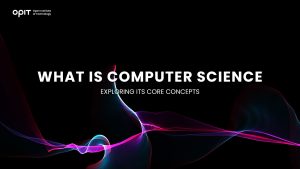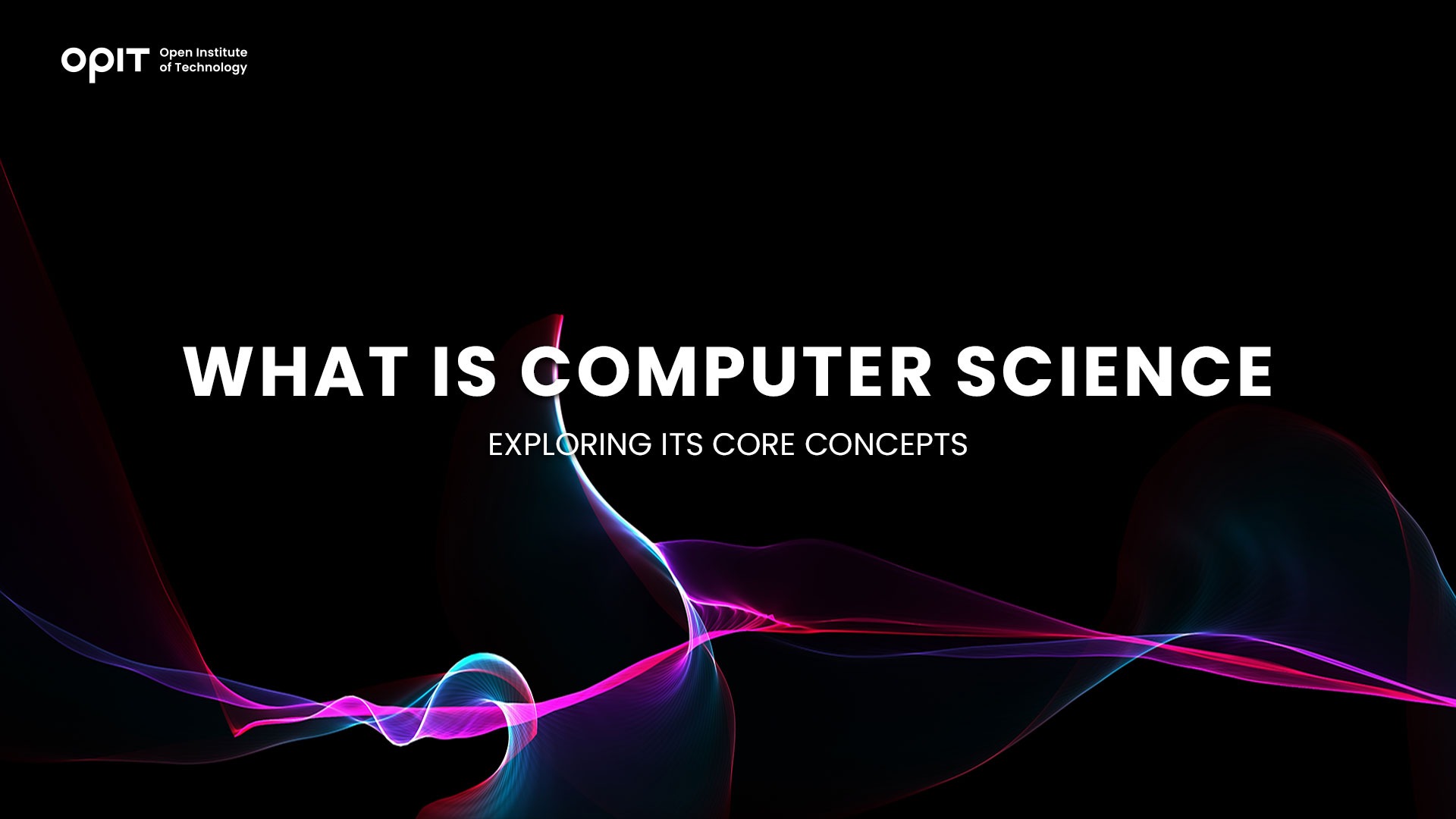

Large portions of modern life revolve around computers. Many of us start the day by booting a PC and we spend the rest of our time carrying miniaturized computer devices around – our smartphones.
Such devices rely on complex software environments and programs to meet our personal and professional needs. And computer science deals with precisely that.
The job of a computer scientist revolves around software, including theoretical advances, software model design, and the development of new apps. It’s a profession that requires profound knowledge of algorithms, AI, cybersecurity, mathematical analysis, databases, and much more.
In essence, computer science is in the background of everything related to modern digital technologies. Computer scientists solve problems and advance the capabilities of technologies that nearly all industries utilize.
In fact, this scientific field is so broad that explaining what is computer science requires more than a mere definition. That’s why this article will go into considerable detail on the subject to flesh out the meaning behind one of the most important professions of our time.
History of Computer Science
The early history of computer science is a fascinating subject. On the one hand, the mechanics and mathematics that would form the core disciplines of computer science far predate the digital age. On the other hand, the modern iteration of computer science didn’t start until about two decades after the first digital computer came into being.
When examining the roots of computer science, we can go as far back as the antiquity era. Mechanical calculation tools and advanced mathematical algorithms date back millennia. However, those roots are too loosely connected to computer science.
The first people who started exploring the foundations of what is computer science today were Wilhelm Schickard and Gottfried Leibniz in early and late 17th century, respectively.
Schickard is responsible for the design of the world’s first genuine mechanical calculator. Leibniz is the inventor of a calculator that worked in the binary system, the universally known “1-0” number system that paved the way for the digital age.
Despite the early advances in the mentioned fields, it would be another 150 years after Leibniz before mechanical and automated computing machines saw industrial production. Yet, those machines weren’t used for any other purpose apart from calculations.
Computers became more powerful only in the 20th century. Like many other technologies, this branch saw rapid development during the last one hundred years, with IBM creating the first computing lab in 1945.
Yet, while plenty of research was happening, computer science wasn’t established as an independent discipline. That would take place only during the 1960s.
Early Developments
As mentioned, the invention of the binary system could be considered a root of computer science. This isn’t only due to the revolutionary mathematical model – it’s also because the binary number system lends itself particularly well to electronics.
The rise of electrical engineering moved forward inventions like the electrical circuit, the transistor, and powerful data storage solutions. This progress gave birth to the earliest electrical computers, which mostly found use in data processing.
It didn’t take long for massive companies to start using the early computers for information storage. Naturally, this use made further development of the technology necessary. The 1930s saw crucial milestones in computer theory, including the groundbreaking computational model by Alan Turing.
Not long after Turing, John von Neumann created a model of a computer that can store programs. By the 1950s, computers were in use in complex calculations and data processing on a large scale.
The rising demand made the binary machine language too unreliable and impractical. The successor, the so-called assembly language, soon proved just as lacking. By the end of the decade, the world saw the first program languages, which soon became the famed FORTRAN (Formula Translation) and COBOL (Common Business Oriented Language).
The following decade, it became obvious that computer science is a field of study in itself, rather than a subset of mathematical or physical disciplines.
Evolution of Computer Science Over Time
As technology kept progressing, computer science needed to keep up. The first computer operating systems came about in the 1960s, while the next two decades brought about an intense expansion in graphics and affordable hardware.
The combination of these factors (OS, accessible hardware, and graphical development) led to advanced user interfaces, championed by industry giants like Apple and Microsoft.
In parallel to these discoveries, computer networks were advancing, too. The birth of the internet added even more moving parts to the already vast field of computer science, including the first search engines that utilized advanced algorithms, albeit not at the same level as today’s engines.
Furthermore, greater computational capabilities created a need for better storage systems. This included larger databases and faster processing.
Today, computer science explores all of the mentioned facets of computer technology, alongside other fields like robotics and artificial intelligence.
Key Areas of Study in Computer Science
As you’ve undoubtedly noticed, computer science grew in scope with the development of computational technologies. That’s why it’s no surprise that computer science today encompasses many areas that deal with every aspect of the technology currently imaginable.
To answer the question of what is computer science, we’ll list some of the key areas of this discipline:
- Algorithms and data structures
- Programming languages and compilers
- Computer architecture and organization
- Operating systems
- Networking and communication
- Databases and information retrieval
- Artificial intelligence and machine learning
- Human-computer interaction
- Software engineering
- Computer graphics and visualization
As is apparent, these areas correspond with the historical advances in computational technology. We’ve talked about how algorithms predate the modern age by quite a lot. These mathematical achievements brought about early machine languages, which turned into programming languages.
The progress in data storage and the increased scope of the machines resulted in a need for more robust architecture, which necessitated the creation of operating systems. As computer systems started communicating with each other, better networking became vital.
Work on information retrieval and database management resulted from both individual computer use and a greater reliance on networking. Naturally, it didn’t take long for scientists to start considering how the machines could do even more work individually, which marked the starting point for modern AI.
Throughout its history, computer science developed new disciplines out of the need to solve existing problems and come up with novel solutions. When we consider all that progress, it’s clear that the practical applications of computer science grew alongside the technology itself.
Applications of Computer Science
Computer science is applied in numerous fields and industries. Currently, computer science contributes to the world through innovation and technological development. And as computer systems become more advanced, they are capable of resolving complex issues within some of the most important industries of our age.
Technology and Innovation
In terms of technology and innovation, computer science finds application in the fields of graphics, visualization, sound and video processing, mathematical modeling, analytics, and more.
Graphical rendering helps us visualize concepts that would otherwise be hard to grasp. Technologies like VR and AR expand the way we communicate, while 3D models flesh out future projects in staggering detail.
Sound and video processing capabilities of modern systems continue to revolutionize telecommunications. And, of course, mathematical modeling and analytics expand the possibilities of various systems, from physics to finance.
Problem-Solving in Various Industries
When it comes to the application of computer science in particular industries, this field of study contributes to better quality of life by tackling the most challenging problems in key areas:
- Healthcare
- Finance
- Education
- Entertainment
- Transportation
Granted, these aren’t the only areas where computer science helps overcome issues and previous limitations.
In healthcare, computer systems can produce and analyze medical images, assisting medical experts in diagnosis and patient treatment. Furthermore, branches of computer science like psychoinformatics use digital technologies for a better understanding of psychological traits.
In terms of finance, data gathering and processing is critical for massive financial systems. Additionally, automation and networking make transactions easier and safer.
When it comes to education and entertainment, computer science offers solutions in terms of more comprehensible presentation, as well as more immersive experiences. Many schools worldwide use digital teaching tools today, helping students grasp complex subjects with fewer obstacles compared to traditional methods.
Careers in Computer Science
As should be expected, computer science provides numerous job opportunities in the modern market. Some of the most prominent roles in computer science include systems analysts, programmers, computer research scientists, database administrators, software developers, support specialists, cybersecurity specialists, and network administrators.
The mentioned roles require a level of proficiency in the appropriate field of computer science. Luckily, computer science skills are easier to learn today – mostly thanks to the development of computer science.
An online BSc or MSc in computer science can be an excellent way to get prepared for a career in the most sought-after profession in the modern world.
On that note, not all computer science jobs are projected to grow at the same rate by the end of this decade. Profiles that will likely stay in high demand include:
- Security Analyst
- Software Developer
- Research Scientist
- Database Administrator
Start Learning About Computer Science
Computer science represents a fascinating field that grows with the technology and, in some sense, fuels its own development. This vital branch of science has roots in ancient mathematical principles as well as the latest advances like machine learning and AI.
There are few fields worth exploring more today than computer science. Besides understanding our world better, learning more about computer science can open up incredible career paths and provide an opportunity to contribute to resolving some of the burning issues of our time.
Related posts

Source:
- EFMD Global, Published on July 12th, 2024.
By Stephanie Mullins
Many people love to read the stories of successful business school graduates to see what they’ve achieved using the lessons, insights and connections from the programmes they’ve studied. We speak to one alumnus, Riccardo Ocleppo, who studied at top business schools including London Business School (LBS) and INSEAD, about the education institution called OPIT which he created after business school.
Please introduce yourself and your career to date.
I am the founder of OPIT — Open Institute of Technology, a fully accredited Higher Education Institution (HEI) under the European Qualification Framework (EQF) by the MFHEA Authority. OPIT also partners with WES (World Education Services), a trusted non-profit providing verified education credential assessments (ECA) in the US and Canada for foreign degrees and certificates.
Prior to founding OPIT, I established Docsity, a global community boasting 15 million registered university students worldwide and partnerships with over 250 Universities and Business Schools. My academic background includes an MSc in Electronics from Politecnico di Torino and an MSc in Management from London Business School.
Why did you decide to create OPIT Open Institute of Technology?
Higher education has a profound impact on people’s futures. Through quality higher education, people can aspire to a better and more fulfilling future.
The mission behind OPIT is to democratise access to high-quality higher education in the fields that will be in high demand in the coming decades: Computer Science, Artificial Intelligence, Data Science, Cybersecurity, and Digital Innovation.
Since launching my first company in the education field, I’ve engaged with countless students, partnered with hundreds of universities, and collaborated with professors and companies. Through these interactions, I’ve observed a gap between traditional university curricula and the skills demanded by today’s job market, particularly in Computer Science and Technology.
I founded OPIT to bridge this gap by modernising education, making it affordable, and enhancing the digital learning experience. By collaborating with international professors and forging solid relationships with global companies, we are creating a dynamic online community and developing high-quality digital learning content. This approach ensures our students benefit from a flexible, cutting-edge, and stress-free learning environment.
Why do you think an education in tech is relevant in today’s business landscape?

As depicted by the World Economic Forum’s “Future of Jobs 2023” report, the demand for skilled tech professionals remains (and will remain) robust across industries, driven by the critical role of advanced technologies in business success.
Today’s companies require individuals who can innovate and execute complex solutions. A degree in fields like computer science, cybersecurity, data science, digital business or AI equips graduates with essential skills to thrive in this dynamic industry.
According to the International Monetary Fund (IMF), the global tech talent shortage will exceed 85 million workers by 2030. The Korn Ferry Institute warns that this gap could result in hundreds of billions in lost revenue across the US, Europe, and Asia.
To address this challenge, OPIT aims to democratise access to technology education. Our competency-based and applied approach, coupled with a flexible online learning experience, empowers students to progress at their own pace, demonstrating their skills as they advance.
Read the full article below:

Source:
- The European, Summer 2024 Edition, Page 24
With careful planning, ethical considerations, and ensuring human oversight is maintained, AI can have huge market research benefits, says Lorenzo Livi of the Open Institute of Technology.
By Lorenzo Livi
To market well, you need to get something interesting in front of those who are interested. That takes a lot of thinking, a lot of work, and a whole bunch of research. But what if the bulk of that thinking, work and research could be done for you? What would that mean for marketing as an industry, and market research specifically?
With the recent explosion of AI onto the world stage, big changes are coming in the marketing industry. But will AI be able to do market research as successfully? Simply, the answer is yes. A big, fat, resounding yes. In fact, AI has the potential to revolutionise market research.
Ensuring that people have a clear understanding of what exactly AI is is crucial, given its seismic effect on our world. Common questions that even occur amongst people at the forefront of marketing, such as, “Who invented AI?” or, “Where is the main AI system located?” highlight a widespread misunderstanding about the nature of AI.
As for the notion of a central “main thing” running AI, it’s essential to clarify that AI systems exist in various forms and locations. AI algorithms and models can run on individual computers, servers, or even specialized hardware designed for AI processing, commonly referred to as AI chips. These systems can be distributed across multiple locations, including data centres, cloud platforms, and edge devices. They can also be used anywhere, so long as you have a compatible device and an internet connection.
While the concept of AI may seem abstract or mysterious to some, it’s important to approach it with a clear understanding of its principles and applications. By promoting education and awareness about AI, we can dispel misconceptions and facilitate meaningful conversations about its role in society.
Read the full article below:
- The European, Pages 24 to 26.
Have questions?
Visit our FAQ page or get in touch with us!
Write us at +39 335 576 0263
Get in touch at hello@opit.com
Talk to one of our Study Advisors
We are international
We can speak in:


